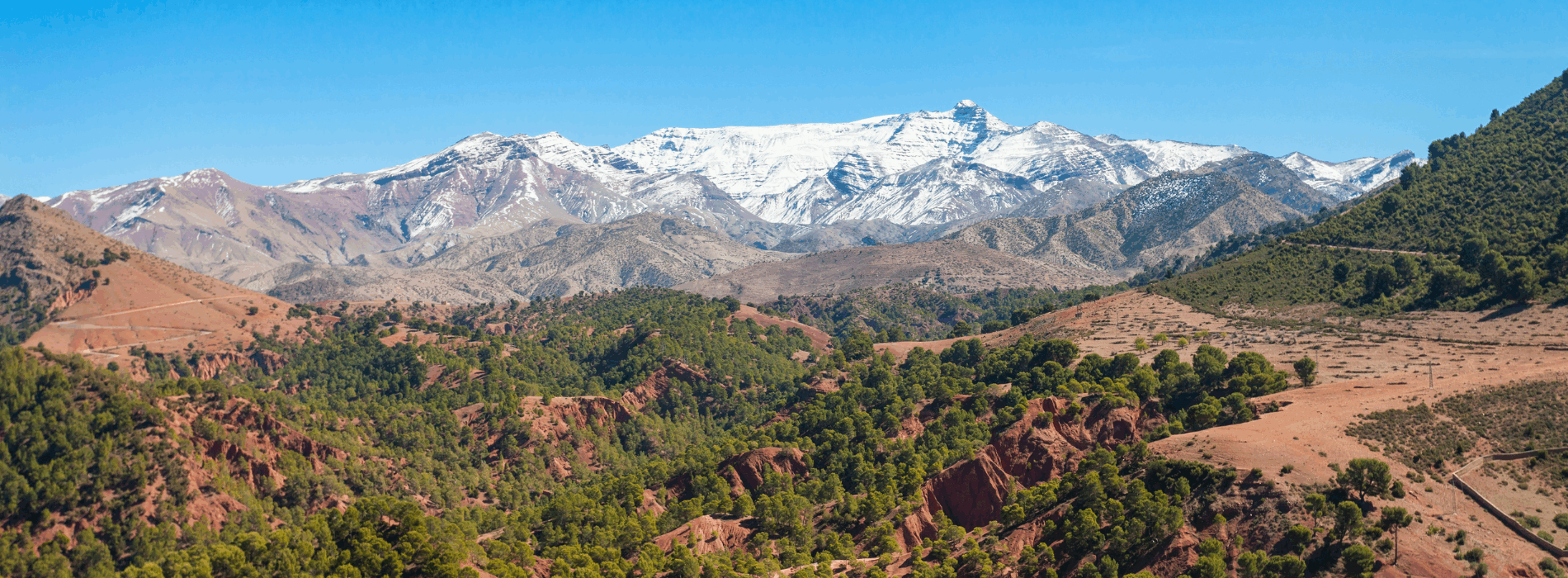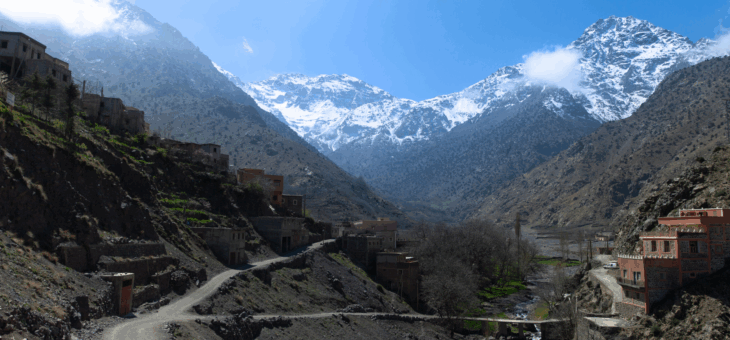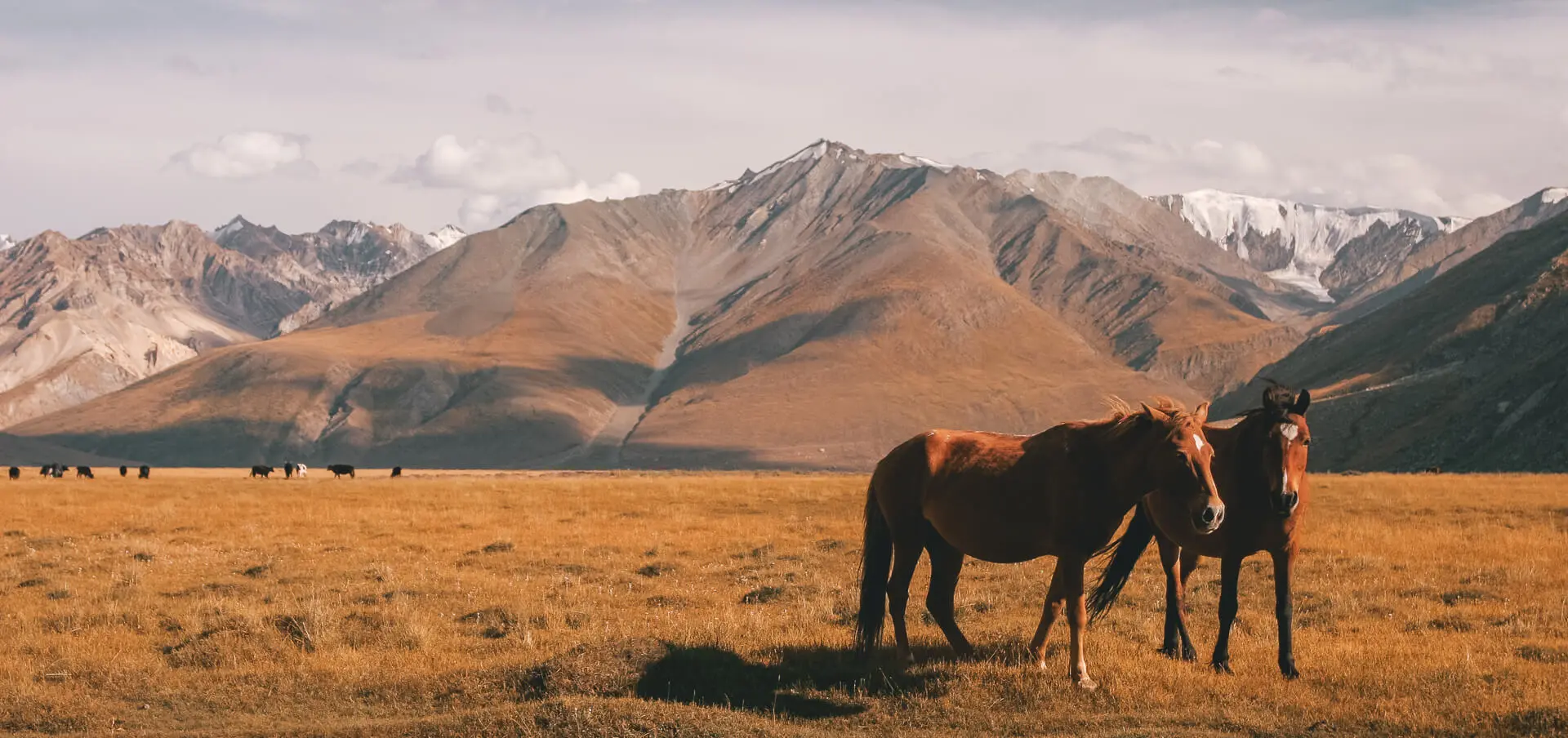If you’re craving a proper mountain adventure but don’t have weeks to spare, Mount Toubkal in Morocco is hard to beat. At 4,167m, it’s the highest peak in North Africa, sitting right in the heart of the Atlas Mountains – and it’s surprisingly easy to get there from Ireland!
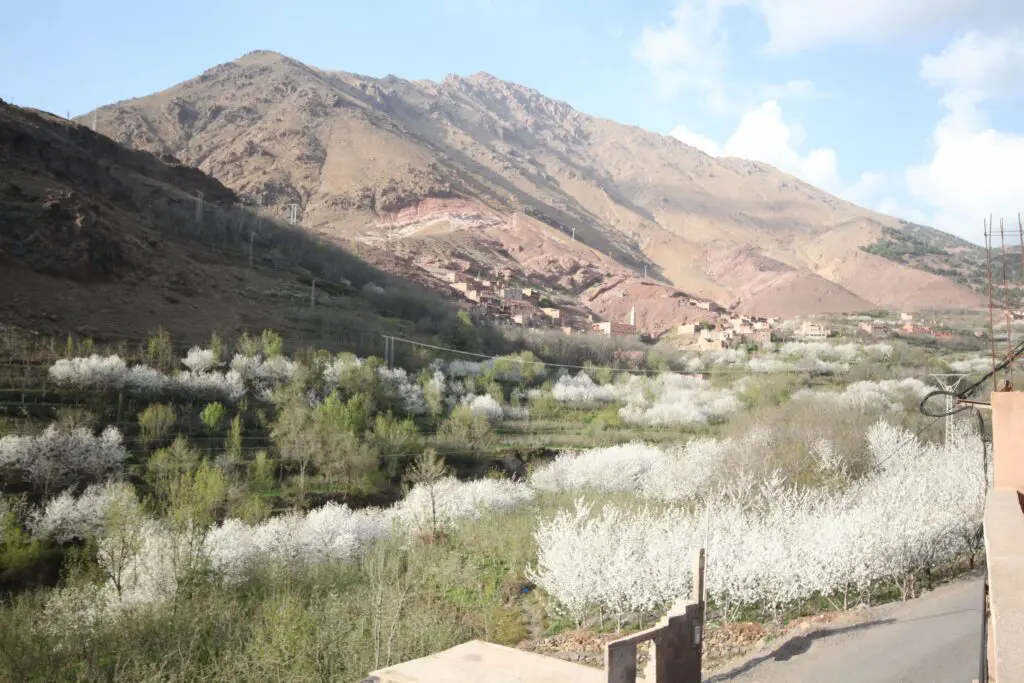
Quick Facts: Earth’s Edge Mount Toubkal Circuit Trek
- Location: Atlas Mountains, Morocco
- Name: Mount Toubkal is called “Jebel Toubkal” in Morocco (Jebel meaning “mountain” in Arabic)
- Height: 4,167m
- Duration: 8-day itinerary with 6 days of trekking
- Difficulty: Moderate – suitable for fit beginners
- Nearest airport from Ireland: Marrakech (Flight time: 4 hours from Dublin)
- Best seasons: April–June, Sept–Oct
Where Is Mount Toubkal?
Mount Toubkal is the highest mountain in North Africa at 4,167 metres, located in Morocco’s Atlas Mountains. For those climbing Mount Toubkal from Ireland, the adventure starts with a short direct flight from Dublin to Marrakech, making it one of the most accessible high-altitude treks for Irish hikers. Just 70km south of Marrakech, Toubkal is within easy reach of the city, offering dramatic views of the Atlas range and even the Sahara Desert on clear days. Many Irish trekkers choose to combine their summit with time exploring Marrakech’s souks and culture, creating the perfect mix of adventure and discovery.
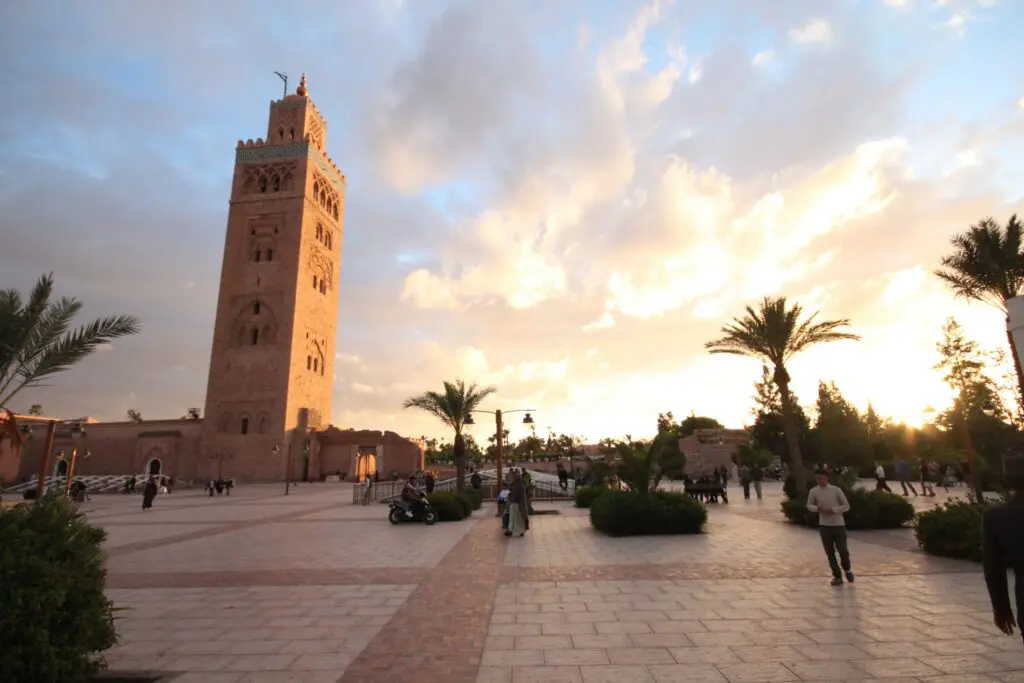
How Easy Is It to Get To Mount Toubkal from Ireland?
One of the biggest advantages of climbing Mount Toubkal (also known as Jebel Toubkal) is its accessibility. You can fly directly from Dublin to Marrakech (RAK) in less than four hours. Both Aer Lingus and Ryanair currently offer direct flights from Dublin for as little as €200 return.
From Marrakech, it’s just a short scenic transfer to Imlil, the gateway to the High Atlas mountains.
At the time of writing, Irish passport holders do not need a visa to enter Morocco for short-term tourist visits up to 90 days. All travellers must have a passport valid for at least six months after their stay ends, with a minimum of two blank pages.
This makes Mount Toubkal one of the quickest high-altitude trekking destinations to reach from Ireland, perfect if you want a big adventure without taking too much time off work.
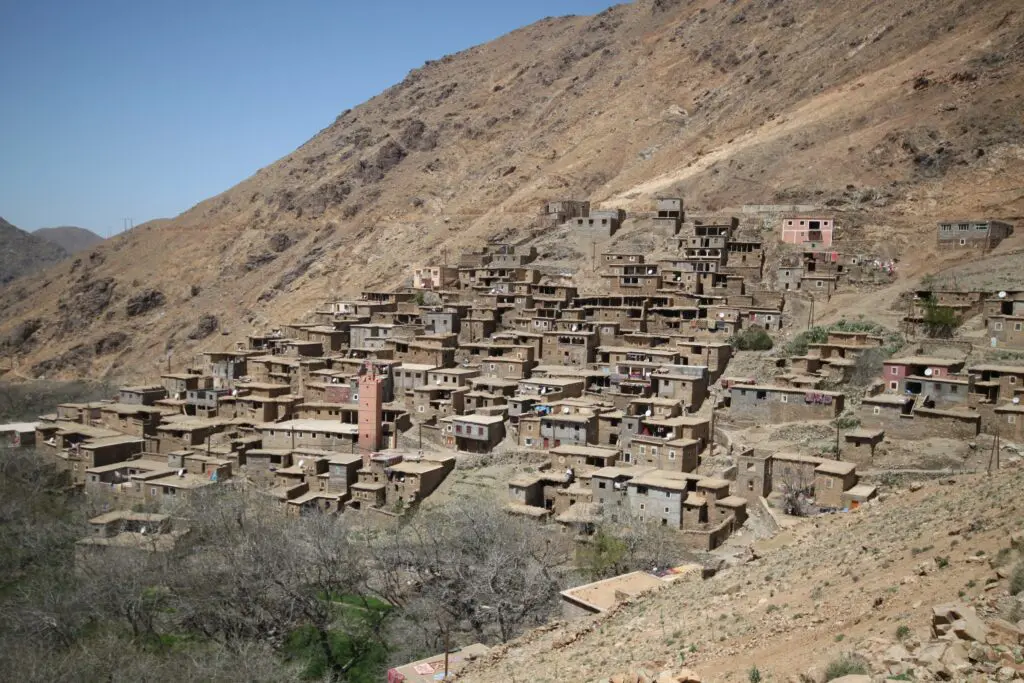
When Is the Best Time to Climb Mount Toubkal?
The most popular times are late spring (April–June) and early autumn (September–October), when skies are clear, temperatures are mild, and the trails are free of snow.
You can also do a winter ascent (November-March) but this is more challenging and requires winter mountaineering skills, and specialist gear like crampons and an ice axe.
Spring (Apr–May): Mild temps, clear trails
Summer (Jun–Sep): Hot in Marrakech, cooler at altitude
Autumn (Oct–Nov): Crisp, quieter trails
Winter (Dec–Mar): Snow trekking; technical gear needed
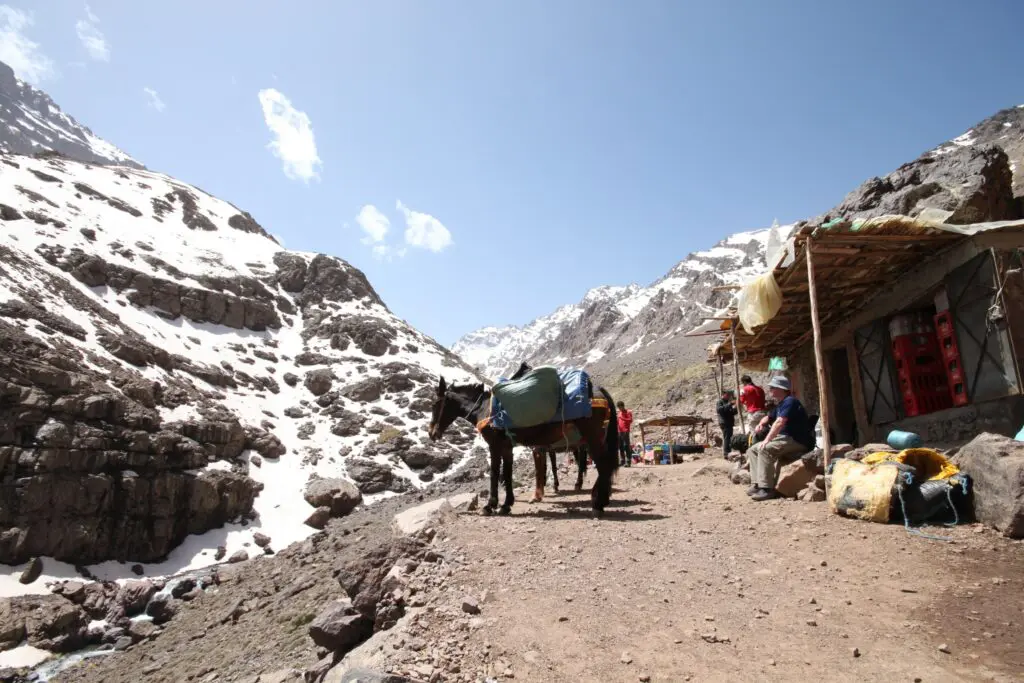
Can You Climb Mount Toubkal Without A Guide?
Nope. Since 2019, Moroccan law requires all trekkers in Toubkal National Park to be accompanied by a registered local guide. This is actually a big plus – not only does it make the trek safer, but your Earth’s Edge Morocco expedition leader will also share stories, history, and local culture along the way, making the journey even richer.
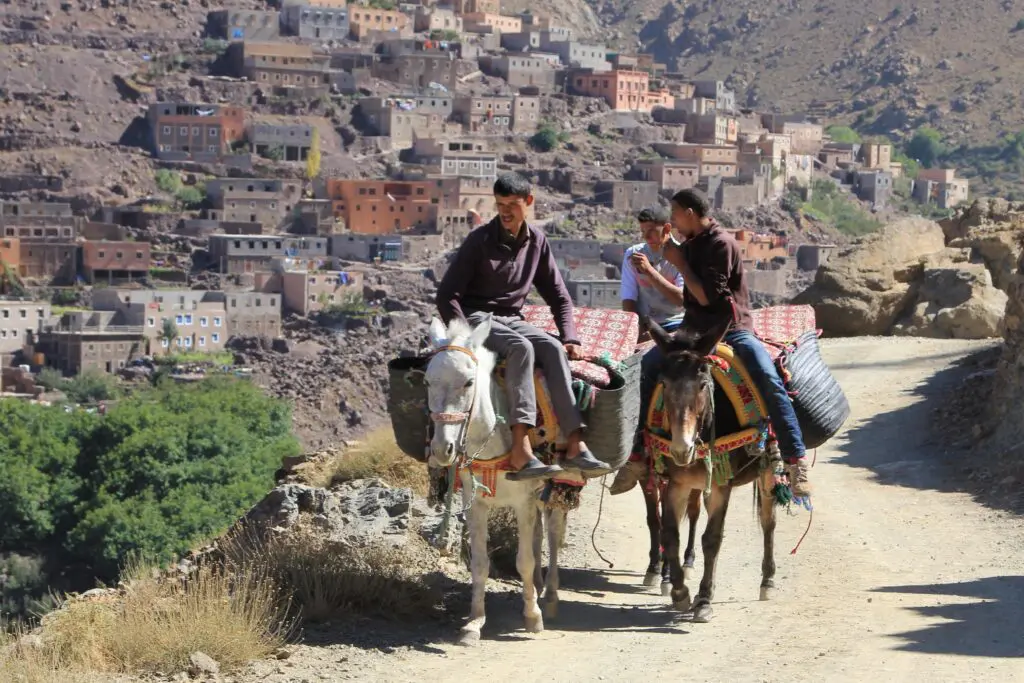
Is Climbing Mount Toubkal Difficult?
Mount Toubkal is challenging enough to feel like a real achievement, but it’s also very doable for fit beginners. Outside of winter, this is a non-technical trek, so no previous mountaineering experience is required – making it perfect for beginners looking to take on their first high-altitude expedition.
You can read our full guide to the challenges of climbing Mount Toubkal and how we set you up for success in our “How Hard Is It To Climb Mount Toubkal? Your Complete Guide” article.
Why Climb Mount Toubkal From Ireland?
- It’s close to home: Less than a half-day’s travel from Ireland
- It’s high: 4,167m is a serious altitude achievement
- It’s cultural: Trek through Berber villages, sleep in mountain refuges, and enjoy authentic Moroccan food
- It’s flexible: You can choose summer trekking or a snow-covered winter ascent
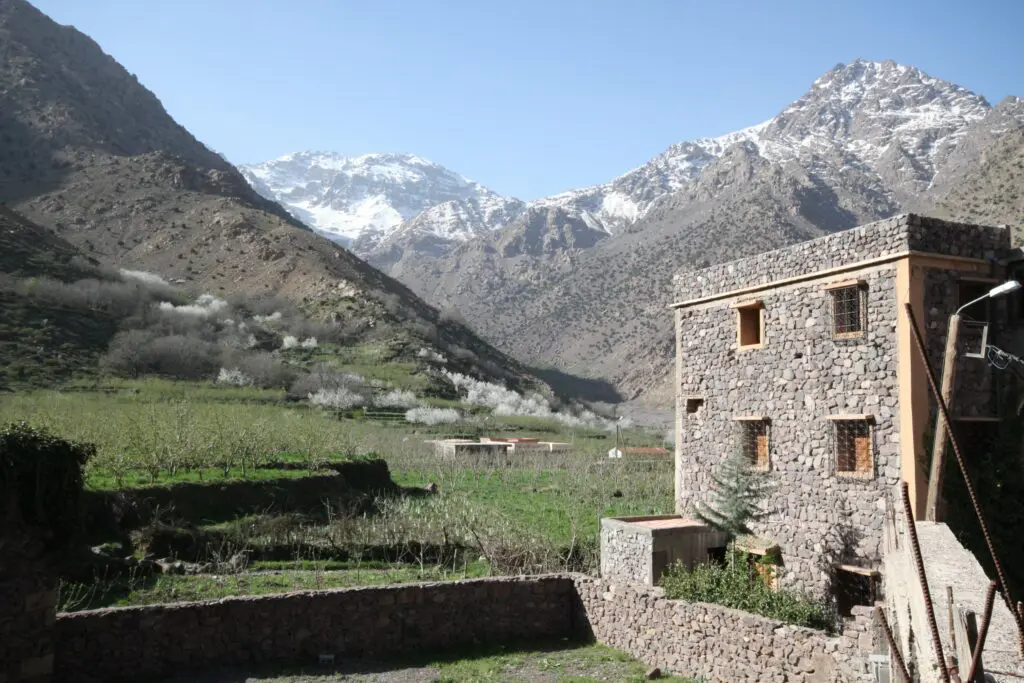
If you’re short on time but big on adventure dreams, Mount Toubkal delivers in spades – epic landscapes, a taste of Moroccan culture, and a proper summit all wrapped up in a week-long trip.
Interested in trekking the Mount Toubkal Circuit with an Irish company? Read all about our NEW Mount Toubkal Circuit expedition!
If you’re still not sure, you can chat to one of the team here when you book your FREE 1:1 trip consultation!
Frequently Asked Questions About Climbing Mount Toubkal
How long does it take to climb Mount Toubkal?
Most people complete the climb in 2–4 days, but a longer Mount Toubkal Circuit spreads the effort over 6 days, allowing for better acclimatisation and a more scenic experience.
Do I need oxygen to climb Mount Toubkal?
No. At 4,167m, oxygen isn’t required, but you might feel the effects of altitude. Going at a steady pace, staying hydrated, and giving your body time to acclimatise are key.
Can I climb Mount Toubkal in trainers?
It’s not recommended. You’ll be trekking on rocky, uneven paths (and possibly snow in early spring or late autumn). A sturdy pair of worn-in hiking boots with ankle support is best.
Is Mount Toubkal harder than Kilimanjaro?
Not usually. Toubkal is shorter in height and duration, making it more accessible for beginners. That said, altitude still plays a role, and summit day is no walk in the park.
Do you get altitude sickness when climbing Mount Toubkal?
At over 4,000m, some people feel mild effects like headache or nausea. The itinerary is designed to allow gradual acclimatisation and your guides will monitor everyone’s condition.
Can you climb Mount Toubkal in one day/How long does it take to climb Mount Toubkal?
While it is technically possible to climb Mount Toubkal in a day, this would require a serious physical effort and hiking in the dark, which is unsafe and doesn’t offer the opportunity to the experience incredible views of the High Atlas mountains. Many companies offer a 2-day ascent option, however, this approach risks an incomplete acclimatisation profile, as well as possible injury from not moving at a steady pace. This is why we recommend taking your time and trekking the full Mount Toubkal Circuit before you attempt to summit.
Can you see the Sahara from Toubkal?
On clear days, you can see the Sahara Desert from Mount Toubkal!
